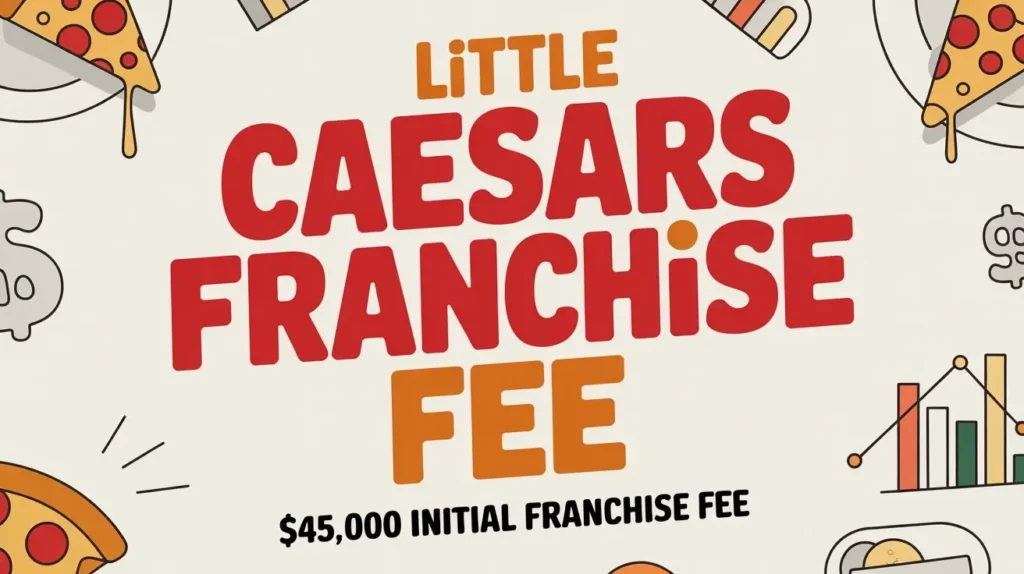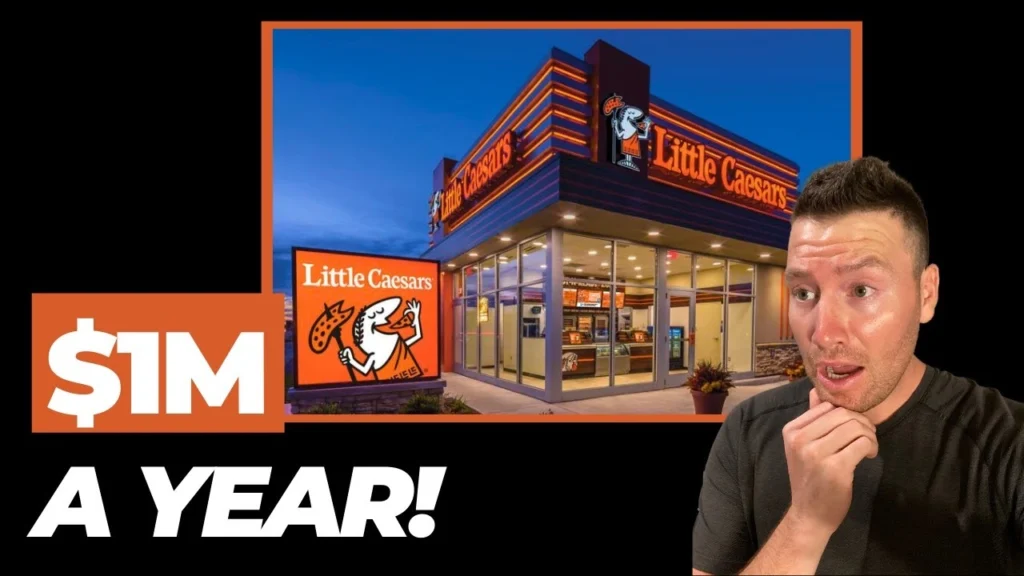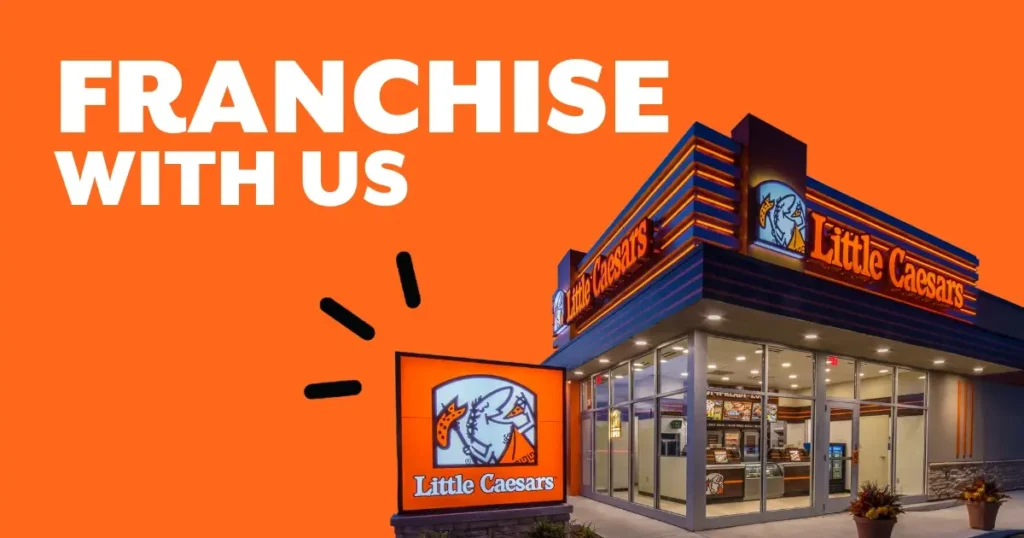Starting a business is exciting but starting with a franchise can feel like plugging into a proven system that’s already built for success. Among popular franchise opportunities, Little Caesars stands out not just for its “Hot-N-Ready” pizzas but also for its relatively accessible startup costs.
As someone who follows technology and business trends, I’ve seen how digital tools, delivery apps, and automation are reshaping the restaurant industry. So when entrepreneurs ask me about the Little Caesars franchise fee, I always explain that it’s not just a number it’s an investment into a well-oiled, tech-supported brand system.
Let’s dive into what the Little Caesars franchise fee includes, how much it really costs to open one, and whether it’s worth your investment.

Content
Understanding the Little Caesars Franchise Fee
If you’ve ever wondered how much does it cost to open a Little Caesars franchise, the short answer is: it starts at around $20,000 for the franchise fee alone.
But that’s only one piece of the bigger picture. The total initial investment can range anywhere from $378,700 to $1.7 million, depending on the location, store type, and construction costs.
Here’s what that franchise fee actually covers:
- Right to use the Little Caesars brand name and trademarks
- Access to proprietary recipes, technology systems, and business model
- Initial training and onboarding for you and your staff
- Corporate marketing and brand support
In essence, the Little Caesars franchise fee buys you entry into a system that’s already fine-tuned for efficiency, one that benefits from decades of data, customer insights, and brand recognition.
Breaking Down the Total Investment
To make things easier, here’s how the total Little Caesars franchise cost typically breaks down:
| Expense Category | Estimated Range (USD) |
| Franchise Fee | $20,000 |
| Equipment, Furniture, Signage | $150,000 – $400,000 |
| Leasehold Improvements | $150,000 – $700,000 |
| Opening Inventory | $10,000 – $15,000 |
| Training & Travel | $12,000 – $20,000 |
| Grand Opening Advertising | $12,000 – $20,000 |
| Working Capital | $20,000 – $50,000 |
These numbers may vary, but they provide a realistic view of what it takes to launch a Little Caesars pizza restaurant.
If we consider the total cost to start a Little Caesars pizza restaurant, it’s actually quite competitive compared to other fast-food franchises, which can easily exceed $2 million.
Ongoing Fees and Royalties
Once your store is up and running, you’ll also have to consider the ongoing franchise royalties. These usually include:
- Royalty Fee: 6% of gross sales
- Advertising Fee: 7% of gross sales
- Technology Fee: Variable, depending on digital systems used
This is where technology trends truly shape the business. Little Caesars has integrated online ordering, delivery partnerships, and smart oven systems that make operations smoother and more efficient. The Little Caesars business model heavily relies on technology to keep costs low and consistency high.
Franchise Requirements You Should Know
Before you get too excited, it’s essential to know the Little Caesars investment requirements. Here’s what you’ll generally need:
- Minimum Net Worth: $350,000
- Liquid Capital: $150,000
- Strong Business or Management Experience
- Commitment to Follow the Franchise System
These requirements ensure you have both the financial and managerial capability to sustain operations successfully.
Technology’s Role in the Little Caesars Business Model

As someone who tracks technology trends, I find Little Caesars fascinating for one major reason—it’s a pizza company that embraces automation and efficiency like a tech startup.
Their Pizza Portal pickup system, a self-service, heated locker that customers unlock with a mobile app is one of the best examples of digital innovation in fast food. It reduces labor costs, speeds up service, and improves customer satisfaction.
This kind of innovation shows how Little Caesars franchise owners benefit from technology-driven cost savings that smaller pizza shops can’t easily match.
Real-Life Case Study: How One Entrepreneur Made It Work
Case Study: The Story of Alex, a Franchise Owner from Michigan
Alex had worked in the IT sector for over a decade before deciding to open a Little Caesars franchise in his hometown. He was drawn to the brand’s solid reputation and scalable technology.
His total investment was around $420,000, including the Little Caesars franchise fee and initial buildout costs. But here’s what made his journey unique: Alex used his tech expertise to optimize operations.
He implemented local marketing automation tools and delivery analytics to track sales patterns. Within 18 months, his store reached profitability.
Alex later told me that understanding technology integration in restaurant operations gave him an edge. From POS analytics to customer behavior data, these systems helped him make smarter decisions and cut down food waste by nearly 15%.
This case perfectly illustrates that the Little Caesars franchise business model rewards those who combine brand systems with modern digital tools.
Comparing Franchise Costs: How Little Caesars Stacks Up

When you compare the Little Caesars franchise fee to other pizza brands, it’s clear why many investors find it appealing:
| Brand | Franchise Fee | Total Investment Range |
| Little Caesars | $20,000 | $378,700 – $1.7M |
| Domino’s | $25,000 | $150,000 – $2M |
| Papa John’s | $25,000 | $200,000 – $2.5M |
| Pizza Hut | $25,000 | $367,000 – $2.1M |
This shows that Little Caesars offers one of the most affordable franchise entry points among major pizza chains. Combined with its technology-forward approach and simple menu model, it’s easy to see why it attracts entrepreneurs looking for lower startup risk.
Is the Little Caesars Franchise Fee Worth It?
So, is the Little Caesars franchise fee worth the investment?
In my opinion yes, if you approach it strategically. The combination of strong brand equity, proven systems, and continuous technology innovation creates a compelling opportunity for both first-time business owners and seasoned investors.
However, success isn’t automatic. You need to manage operations efficiently, hire and train the right team, and stay ahead of local market trends.
Think of the franchise fee not as a cost, but as an entry ticket to a network that has spent decades refining a profitable system supported by marketing, tech, and logistics infrastructure.
Conclusion:
Starting a Little Caesars franchise can be a smart move for entrepreneurs who want to leverage a trusted brand while benefiting from digital-driven efficiency. The Little Caesars franchise fee gives you access to a complete ecosystem of training, tech systems, support, and brand power.
If you want to explore opportunities or expand your reach, feel free to advertise with us for maximum visibility and support.
From my experience observing franchise trends, the best outcomes happen when owners mix operational discipline with modern digital tools. The pizza might be old-school, but success in this business now relies on data, technology, and strategy just as much as dough and sauce.
If you’re ready to explore this opportunity, do your due diligence, study your local market, and talk to existing franchisees. Their insights, combined with smart tech integration and Business Income Insurance, can make your investment truly pay off.
FAQs About Little Caesars Franchise Fee:
How much is the Little Caesars franchise fee?
The Little Caesars franchise fee is about $20,000, giving you access to brand support and proven business systems.
How much does a Little Caesars owner make a year?
A Little Caesars owner can earn around $90,000–$150,000 yearly, depending on sales, location, and management efficiency.
What is the cheapest pizza franchise to own?
Little Caesars is among the most affordable pizza franchises, with total startup costs starting under $400,000.
Is a Little Caesars franchise worth it?
Yes. The Little Caesars franchise fee offers solid value, strong brand power, and tech-driven systems that boost profitability.

Ryan Jones is a business blog author and writer. He graduated from the University of California, Berkeley in 2009 with a degree in Political Science. His favorite topics to write about are blogging for small businesses and becoming an entrepreneur.

